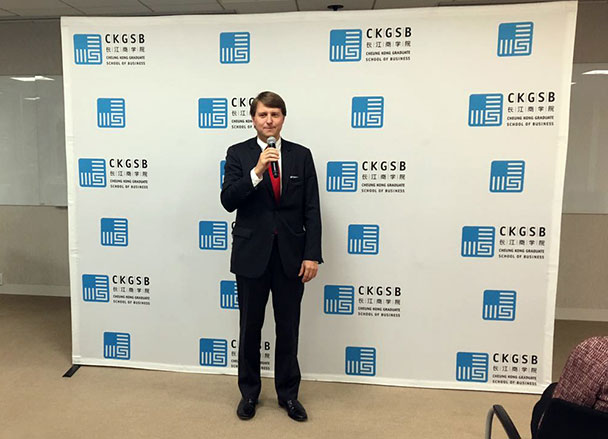CKGSB Americas hosted Christopher Nixon Cox—the grandson of President Richard
Nixon, co-founder of the advisory firm OC Global Partners, and advisor to the Donald Trump presidential campaign—to speak at its latest Knowledge Series event on October 6, 2016.
Cox, who has extensive business ties to the Middle East and East Asia, gave members of the CKGSB community his perspective on US-China relations, the state of the American presidential race and what effect the outcome of the race will have on American foreign policy.

Cox (pictured above) said that the first thing he remembers his grandfather telling him about China was that a “peaceful and prosperous China was very important for maintaining global stability.” He argued that China has a long history of working with its neighbors to de-escalate conflicts and playing a constructive role in the maintenance of world peace. “The next century will be a Pacific century,” Cox said. “And the most important relationship will be between China and the United States.”
While the importance of the Sino-American relationship is obvious in the long run, how that relationship develops in the near term is very dependent on the outcome of the American presidential election being held on November 8.
As an advisor to Donald Trump, Cox has a unique perspective on the candidate’s strengths and weaknesses. He argued that although there are indications that the American electorate would like a change after eight years of a Democrat in the White House, Donald Trump’s undisciplined manner on the campaign trail has made him an unacceptable alternative for many voters, especially those with a college education.
Cox says that while Trump has lost support among highly educated voters, he has made up for in part by the enthusiasm he engenders in working-class white voters who are flocking to the Republican Party in record numbers. Trump has succeed in this by “changing what the Republican Party stands for,” giving the example of Trump’s skepticism towards free trade agreements as one example.
Cox warned, however, that Trump’s strategy of placing less focus on minority voters and college-educated whites in favor of rallying support among the working class is a risky strategy. “He’s going after a section of the voting populace who aren’t habitual voters,” Cox said. “They aren’t even necessarily registered.” He pointed out that just 55% of working-class white voters show up to the polls on Election Day, while more than 70% of college-educated folks do.
Where Donald Trump has the upper hand, he argued, is in voter enthusiasm. Supporters of Donald Trump are more excited about their nominee than supporters of the Democratic nominee, Hillary Clinton. ”Donald Trump has energy on his side,” Cox said, “which should help him as we get closer to election day.”
Whoever does end up in the White House come January will face the all-important project of continuing to build trade and diplomatic relations with the People’s Republic of China. That’s because it’s in the realm of foreign policy that a President has the latitude to act without the support of the Judiciary or Congress, which will likely be divided and gridlocked next year.
Cox said that we should expect a continuation of the Obama Administration’s policy toward China if Hillary Clinton were to win, and that means cooperation on issues like climate change but a tougher stance on issues like the South China Sea and human rights.
A Trump Administration’s attitude toward China, however, is more difficult to predict. Trump has talked tough with regards to US-China trade policy, but because Trump has never held office before and has shown a willingness to change positions, it’s difficult to say whether observers should take his promises seriously. “With Trump, we have no idea whether he’s really going to follow through on his trade proposals or not,” Cox said. “And that’s been a source of concern for a lot of Republicans.”
Cox, like many Republicans across the country, is supporting Donald Trump, but is doing so with some reservations. Ultimately, many are being persuaded to support Trump out of their dislike of Clinton rather than confidence in the Republican nominee.
Cox said the most interesting question for him is what direction the Republican Party will take post-Donald Trump. Cox argued that Trump’s support comes from Republican voters “thinking he’ll shake things up,” rather than being attracted to his anti-trade and isolationist policies.
Following his discussion, Cox took questions from members of the CKGSB community, who showed a great interest in the American political process in general and Donald Trump in particular. One topic raised by the audience was how to promote a better relationship between China and the United States. Cox harkened back to his grandfather’s belief that that because China and the US have great interest in maintaining global stability, there was room to collaborate on issues ranging from de-escalating conflict on the Korean peninsula to defusing conflicts in the emerging world. As he put it, “Identifying areas that we can work together is critical for improving the US-China bilateral relationship.”